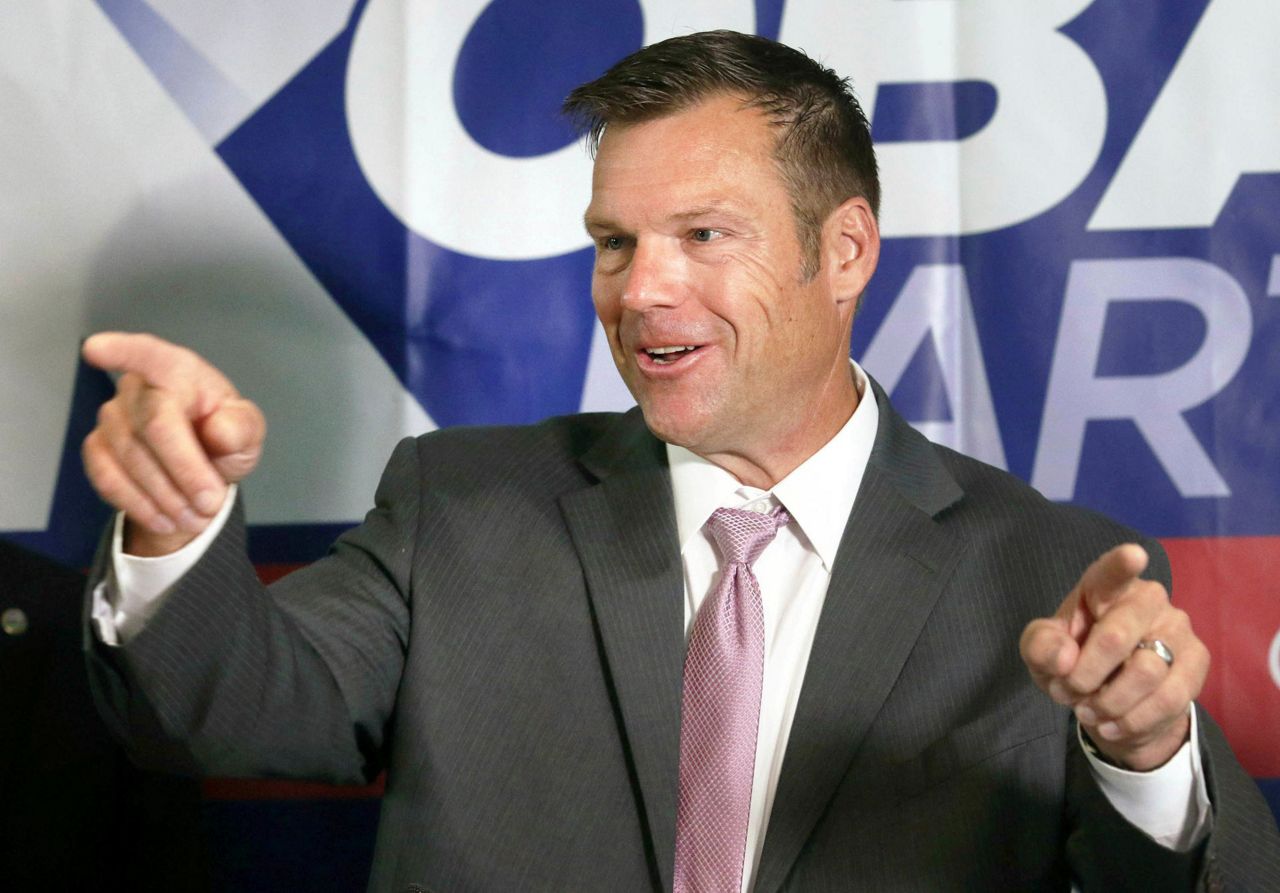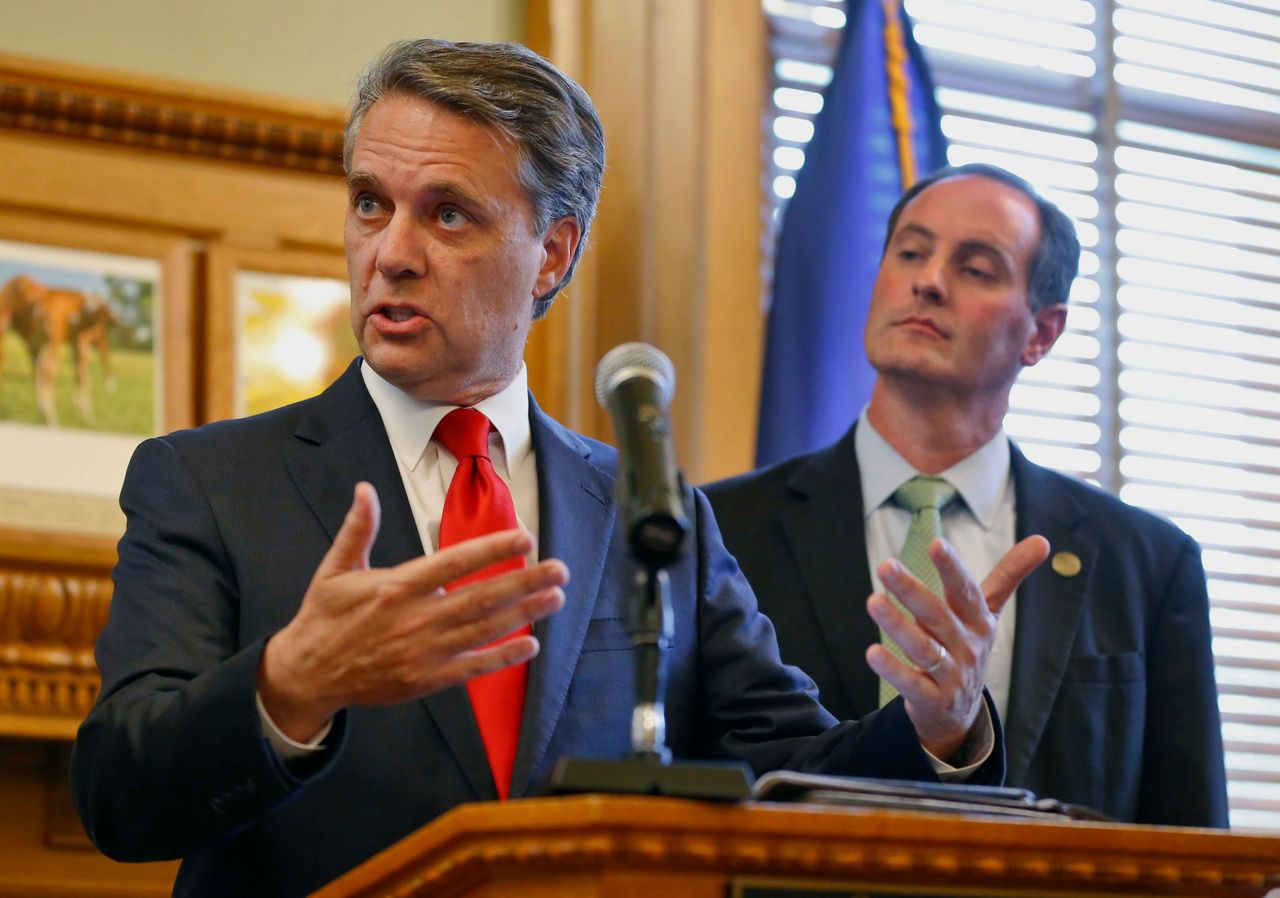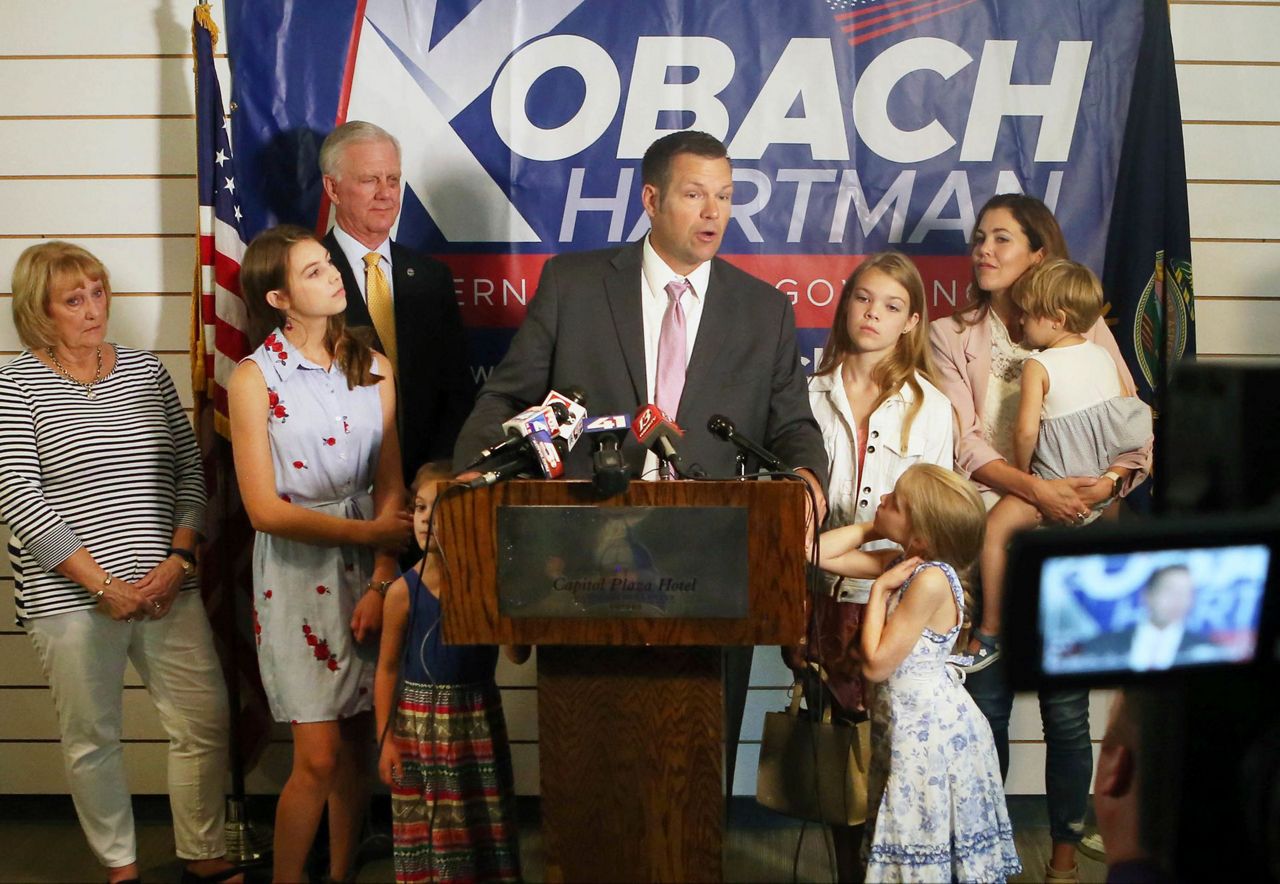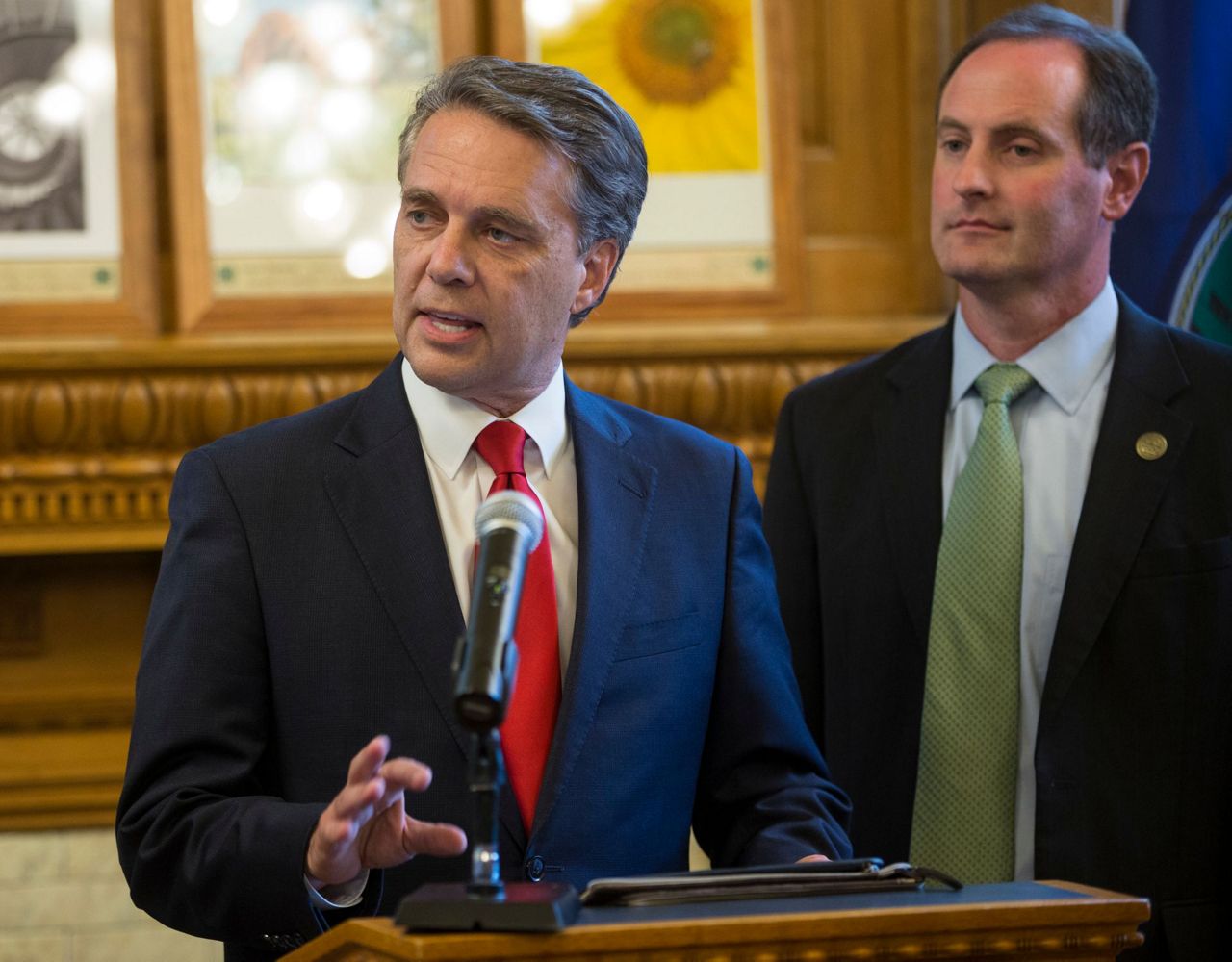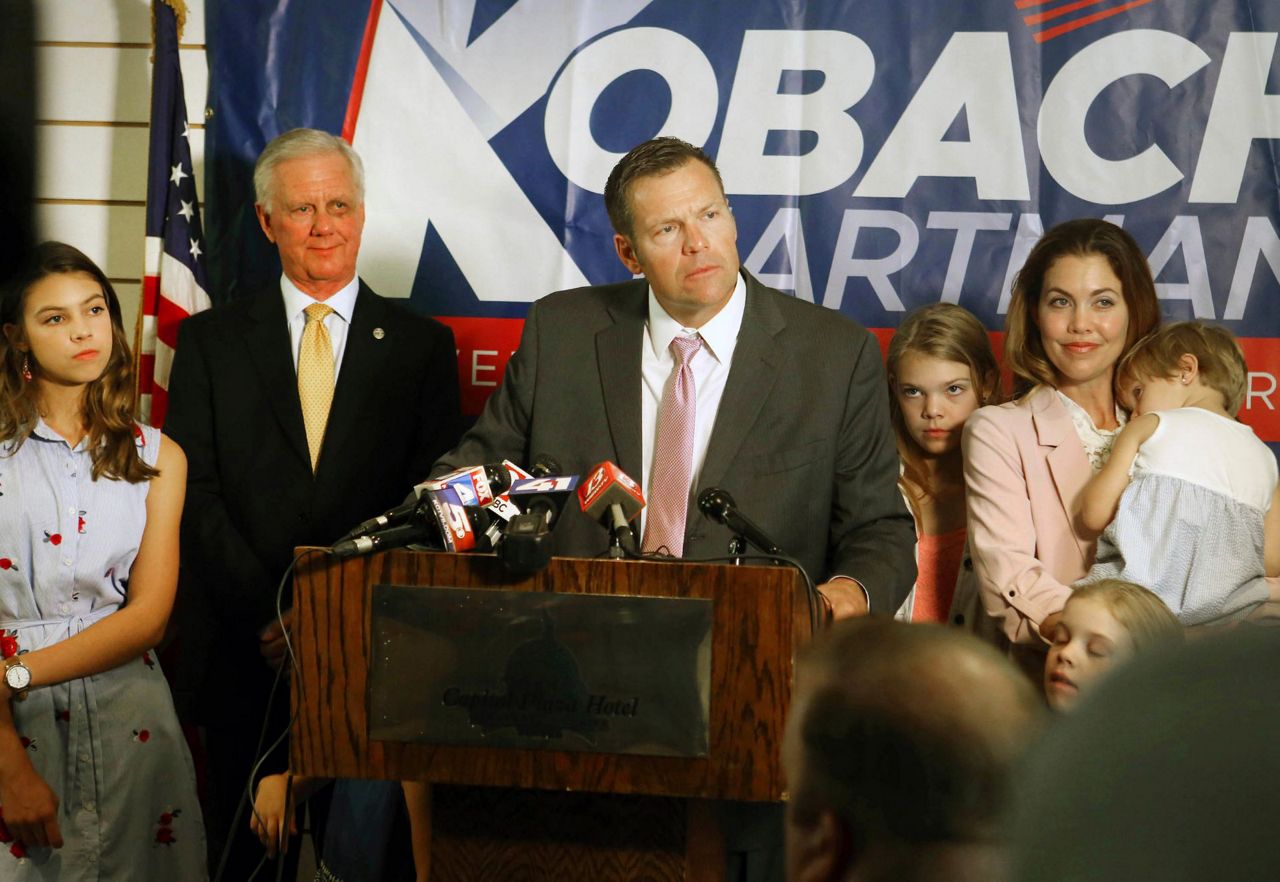TOPEKA, Kan. (AP) — Out-of-power Kansas Democrats smelled opportunity Wednesday in the tight, unsettled GOP primary race for governor between Gov. Jeff Colyer and Secretary of State Kris Kobach, a close political ally of President Donald Trump and a conservative lightning rod who alienates even some Republicans.
Kobach led Colyer by fewer than 200 votes out of the more than 300,000 cast in the seven-candidate Republican primary contest. The state won't have final results until at least early next week because thousands of mail-in and other ballots have yet to be counted — and a recount seems likely if the tally remains as close.
But Kobach moved to both cement his status as the presumptive nominee and blunt any advantage Democrats might gain from the short-term uncertainty about the GOP nominee. He said during a news conference that he's launching the fall campaign immediately and will turn it over to Colyer if further vote-counting makes Colyer the nominee.
"It is essential that we run this race as a team, a relay team, if you will," Kobach declared. "Whenever Republicans in the past have lost statewide races or have lost big congressional races, it's almost always because of disunity within our party."
Kansas has been deeply red since 2010, when the GOP began a clean sweep of statewide and congressional races. But the state also has a solid bloc of moderate GOP and independent voters and a history over the past 50 years of alternating between electing Republican and Democratic governors.
Colyer was trying to avoid becoming the first Kansas governor to lose a primary since 1956, and the first nationally since Hawaii's Neil Abercrombie lost a Democratic primary in 2014.
Results were slow in coming Tuesday night and Wednesday morning from the state's most populous county, Johnson County in the Kansas City area, which has 23 percent of the state's registered voters. The county suffered problems with new voting machines .
The governor did not concede, citing the closeness of the vote and the "extraordinary problems" in Johnson County in a statement.
"To be honest, we're very optimistic that those votes will continue to come in on our side," Colyer said later, during a Statehouse news conference. "We want to make sure that every vote — every legitimate vote — is counted, and that's what our expectation is over the next couple of weeks."
Kobach did not rule out a recount and said he would not blame Colyer for seeking one if the race remains extraordinarily close. Kansas has no provision for automatic recounts.
In a primary, a candidate must post a bond and pay for the recount if the results don't change — and Colyer's campaign sent out a fundraising email Wednesday afternoon.
But when he was asked about the possibility of a recount, Colyer said: "My focus is: We've got to get this first count right."
As the state's chief elections officer, Kobach is facing questions about whether he should recuse himself from any involvement in a recount. He told reporters that county officials would do the actual work and forward the results to his office.
"The secretary of state's office merely serves as a coordinating entity, overseeing it all, but not actually counting the votes," he said.
The Democratic nominee for governor is veteran state Sen. Laura Kelly, of Topeka, who has some appeal among GOP moderates.
Kansas City-area businessman Greg Orman also has launched what could become the most serious independent candidacy for governor since the 1930s and argues he can build a coalition starting with voters upset with both parties.
While Orman's bid complicates Democrats' efforts to recapture the governor's office, they expect to tap into voters' dissatisfaction with former Republican Gov. Sam Brownback and the budget woes following now-largely reversed income tax cuts Brownback championed. Colyer was elevated to governor from lieutenant governor in January when Brownback stepped down for an ambassador's post.
Democrats have tied both Colyer and Kobach to Brownback for months. Kobach has promised to cut both income and sales taxes — and reduce government spending to make it work.
Kelly said Wednesday that voters "want to put the last eight years behind us."
"They want to slam that door tight and move on," she said. "It sort of doesn't matter whether it's Kobach or Colyer. Both of them will bring all of that back, one way or another."
But Ethan Corson, the Kansas Democratic Party's executive director, said an unsettled GOP race helps.
"We've emerged from last night unified," Corson said. "They are well on their way to what could be another week of a brutal and toxic gubernatorial primary."
Some Republicans worried that Kobach's aggressive personality would create the opening that Democrats need, even with Orman running a strong campaign.
After voting for Colyer on Tuesday in Topeka, Carolyn Wojakowksi, a 71-year-old retired teacher, said she supported the governor because she believes he has the better chance of winning the general election.
As for Kobach, she said: "He's alienated himself from part of the people in Kansas by his strong stance."
___
For the latest information on the Kansas primary election: https://apnews.com/cb6342773a6145d18863036e3d67e92f
___
Follow John Hanna on Twitter at https://twitter.com/apjdhanna
___
Sign up for "Politics in Focus," a weekly newsletter showcasing the AP's best political reporting from around the country leading up to the midterm elections: https://bit.ly/2ICEr3D
Copyright 2018 The Associated Press. All rights reserved. This material may not be published, broadcast, rewritten or redistributed.



